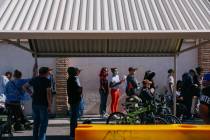Man free in murder case after 10 years in county jail
If not for his dying mother and a persuasive uncle who helped raise him, Jesus "Jesse" Meraz might have spent an 11th year behind bars at the Clark County Detention Center.
Meraz, 38, was first locked up on murder charges in October 2005.
Before Christmas, prosecutors extended an offer for him to plead guilty and be released from jail. Meraz had twice been to trial, the first ending in a hung jury. At the second, the jury convicted Meraz of second-degree murder and assault with a deadly weapon, but the Nevada Supreme Court reversed the verdict.
It had been more than 10 years since gunfire erupted at the North Las Vegas AM/PM convenience store at 2000 E. Cheyenne Ave., leaving a 19-year-old man dead. The prosecution's star witness, Karla Barboza, another teen who was shot in the left leg, had been deported to Mexico after testifying at the first trial. She has been impossible to track down.
For the entire decade, Meraz adamantly maintained his innocence, and he resisted the latest deal for weeks. He had rejected past offers as well. He risked the possibility of life behind bars if convicted of second-degree murder at a third trial, even though prosecutors agreed that he could walk free.
In court last week, Meraz's lawyer, Ozzie Fumo, consulted with him at length, comforting him with taps on the shoulder, as his uncle Mike Valenzuela spoke to him with a stern expression.
Meraz cried.
"Why should I admit to something I didn't do?" he told his uncle.
Meraz admits he was at the gas station the night of the killing but says he was standing in a different location than the shooter, according to his lawyer.
"This guy has maintained his innocence from Day One," Fumo said. "Everything he's told me has eventually come to light as true."
On Monday, after years of fighting his case, Meraz pleaded guilty to voluntary manslaughter. He did so under what's known as the Alford decision, which means he would deny the facts of the case but acknowledge prosecutors have enough evidence to prove his guilt.
Prosecutors have staunchly maintained that Meraz was the triggerman who killed Jonathan Moza-Daza and injured his 15-year-old girlfriend.
At Meraz's first trial in 2006, jurors had voted 11 to 1 in favor of a murder conviction, according to prosecutors.
Barboza testified that Meraz fired four shots shortly after midnight on Oct. 8, 2005. She noted Meraz's distinct appearance at the time: a shaved head with a long, double ponytail that twisted together at the middle of his back.
Although one other person with Barboza at the time also fingered Meraz, several other people at the scene said they could not identify the gunman. Police had tracked down Meraz through a debit card purchase at the gas station and collected gunshot residue from the shirt he wore that night.
Meraz pointed to another man, whose name he did not know, as the shooter.
Meraz testified that he was defusing a scuffle when he heard the gunfire.
"My eyes swelled up," he said. "The gentleman I was looking at, his eyes swelled up. I checked my body and ran."
At a second trial in 2008, during which prosecutors used transcripts of Barboza's testimony, Meraz was convicted of second-degree murder and assault with a deadly weapon, and sentenced to 20 years to life in prison. Meraz served a brief stint in state custody before the conviction was overturned by the Nevada Supreme Court, and he was sent back to the county jail, where he remained until last week.
"He was held accountable for the crime, and in a roundabout, he way took responsibility for the crime, even though he did not admit guilt," prosecutor Danielle Pieper said. "Justice comes in different shapes and sizes, and in the state's opinion, justice was served in this case for the life that was lost."
The state high court found that the evidence against Meraz was sufficient for a guilty verdict because of gunshot residue found on his shirt and the two witnesses who identified him as the gunman. But the case was reversed because a lower court judge allowed sworn testimony to be read into the record at the trial, without a solid enough record to prove prosecutors made reasonable efforts to find the witness.
"The court made no record as to the reasonableness of the state's efforts in attempting to procure Barboza's live testimony and did not make an unavailability finding on the record," the court wrote. "While the evidence the state adduced at trial — apart from the surviving witness's testimony — may have been sufficient to support his convictions, it was not overwhelming."
Nearly five years after that ruling, Meraz was released from jail at 9:44 p.m. Monday, less than a week before his third trial was scheduled to start. He had received credit for 3,730 days served, more than the maximum sentence of 10 years for voluntary manslaughter.
He had been locked up so long that the clothes he had on during his arrest were long gone. Officers handed him a button-down brown shirt, blue jeans and a pair of Air Jordans, just like the shoes he wore more than a decade ago.
His attorney and a group of relatives were there to greet him, and he collapsed in their arms.
"You're a great attorney," Meraz told Fumo. "But I didn't do it. I still want to fight."
If Meraz finds new evidence that was unavailable at the time his case was pending in court, he could try to show his innocence and possibly get the case completely dismissed.
"That's what he would like to do," Fumo said.
Meraz's mother lives in Texas and has grown so ill that for seven years, she has been unable to travel to see her son. His family does not know how much longer she will be alive.
"The first thing he needs to do is go home to see his mother," Valenzuela said. "We'll take it a day at a time."
Those family members plan to help get Meraz back to work and living life as a free man.
Contact David Ferrara at dferrara@reviewjournal.com or 702-380-1039. Find him on Twitter: @randompoker.



















